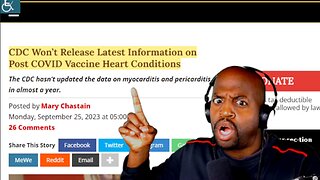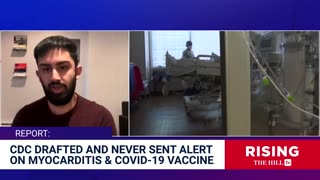CDC Admits: We Withheld Important Information. COVID-19 Vaccines Causes Heart Problems.
https://austincountynewsonline.com/fda-releases-more-data-on-adverse-reactions-to-pfizer-vaccine/
https://nypost.com/2020/10/20/some-covid-19-vaccines-could-increase-hiv-risk-researchers/
he Centers for Disease Control and Prevention are considering changing vaccine guidance to lengthen the time in between doses of certain vaccines because of the risk of heart inflammation.
More time between the first two doses of the mRNA COVID-19 vaccines appears to reduce the risk of myocarditis, a rare type of heart inflammation seen in some after getting an mRNA vaccine, and it could improve the shots’ effectiveness, researchers told the CDC’s Advisory Committee on Immunization Practices.
According to the CDC, the proposed changes would apply to the Pfizer and Moderna COVID-19 vaccines, which use the mRNA technology.
Under the current guidelines, the two Pfizer COVID-19 vaccine doses are given three weeks apart, and the two COVID-19 vaccine doses from Moderna are given four weeks apart.
Reports of an increase in myocarditis in some – particularly men between the ages of 18 and 39 – following a COVID-19 vaccination prompted researchers to look at the interval between doses, Dr. Nicola Klein, a vaccine researcher at Kaiser Permanente Northern California, told the committee in a presentation Friday.
According to Dr. Bryna Warshawsky, a medical adviser with the Public Health Agency of Canada, rates of myocarditis fell when the interval between the two doses was extended.
In addition to a decline in the rate of myocarditis, researchers reported to the committee that a greater interval between doses appears to create higher antibody responses from the body and higher vaccine effectiveness.
As the FDA prepares to approve Pfizer’s new pill for treating high-risk patients infected with COVID, more information about dangerous side effects tied to its vaccine are coming to light.
Just yesterday, we reported another death tied to the vaccine in New Zealand. Now, documents released by the FDA reveal that drugmaker Pfizer recorded nearly 160K adverse reactions to its COVID vaccine in the initial months of its rollout.
The data were obtained by a group of doctors, professors, and journalists calling themselves Public Health and Medical Professionals for Transparency. They filed a Freedom of Information Act request with the FDA asking for their release. And the first tranche of documents revealed that, as of February 2021, when Pfizer’s shot was being rolled out worldwide on an emergency basis, the drug maker had compiled more than 42K case reports detailing nearly 160K individual adverse reactions to the vaccine.
The data show the bulk of the adverse event cases, both serious and non-serious, were classified as “general disorders”.
Among the more common conditions reported were fevers (pyrexia), fatigue, and diarrhea, among others.
But perhaps the most surprising number in the entire report is that more than 1K of these cases were fatal in the US. All told, more than 3K deaths have been linked to the vaccine, something that’s in line with the company’s own data. Critics have argued that some of the deaths can’t be conclusively linked to the vaccine, but others have instead insisted that the number of deaths might still be underreported.
-
 7:46
7:46
the Conservative TAKE
8 months agoCDC Refuses to Release Updated Information on Post-COVID Vaccination Heart Inflammation
85 -
 0:48
0:48
NEWS AND STUFF
6 months agoMedical officer reveals Covid Vaccine related HEART ISSUES
25 -
 1:55
1:55
vinnyhearns
7 months agoDr. Drew: Covid Vaccine Causing Heart Damage In Young Subjects
41 -
 1:03
1:03
iamthe1
1 year agoPfizer Scientist Knew Covid Vaccines Would Cause Heart Damage
74 -
 9:59
9:59
Press News Trending
4 months agoCDC Drafted, Held Back MYOCARDITIS ALERT On Covid Vaccines
21 -
 0:55
0:55
Dissident7
8 months agoCDC Concealing Vaers Data on Heart Inflamation Cases from Covid Vaccine (Myocarditis, Pericarditis)
29 -
 5:50
5:50
Restored Republic
1 year agoCDC Identifies Possible ‘Safety Concern’ for Certain People Receiving COVID Vaccines
2592 -
 24:15
24:15
Unveiling Earth's Mysteries
1 year agoCOVID-19 Vaccines Risk of Heart Problems Dr. John Campbell
256 -
 5:02
5:02
Uncensored Pharmacist
2 years ago $0.11 earnedCDC withholds COVID vaccine data to prevent "vaccine hesitancy"
129 -
 7:08
7:08
Lies of the Devil
1 year agoBBC Admits COVID Vaccines Cause Excess Cardiovascular Deaths
220